Breaking from colleagues, judge votes for annulment in Bolsonaro trial
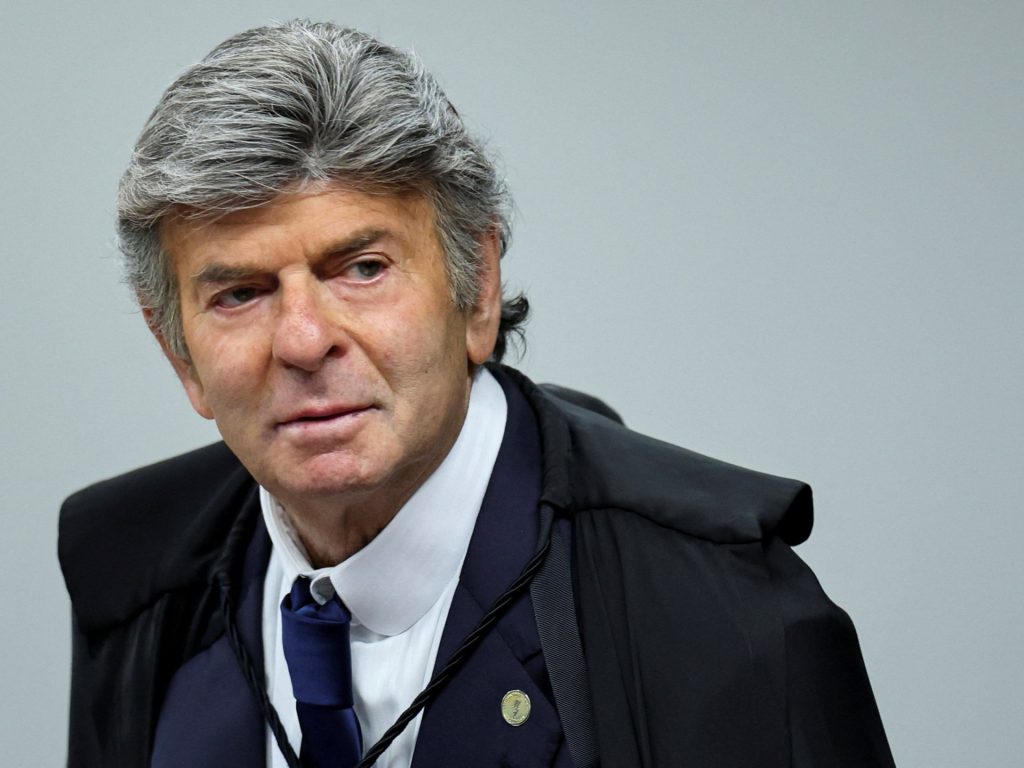
Justice Luiz Fux insists the court has no jurisdiction to decide if the former president is guilty of plotting a coup. Published On 10 Sep 202510 Sep 2025 Click here to share on social media share2 Share Brazilian Supreme Court Justice Luiz Fux has called for the annulment of the case against former President Jair Bolsonaro due to what he called an “absolute lack of jurisdiction” for the five-judge panel hearing the case. His vote on Wednesday is the third of five to be cast this week, as judges deliberate on the charges facing the former president, who stands accused of plotting a coup to remain in power after losing the 2022 election. Recommended Stories list of 3 itemsend of list The high court still seems likely to convict Bolsonaro: Two judges have already voted to convict, and the remaining two were appointed by leftist President Luiz Inacio Lula da Silva, who defeated Bolsonaro. The former president stands accused of taking part in an armed criminal organisation, attempting to violently abolish democracy, organising a coup, and damaging government property and protected cultural assets. His lawyers have maintained his innocence on all counts. Fux argued on Wednesday in the trial’s final deliberations that the case should have been heard by lower courts because Bolsonaro had left office. “I vote … that the Supreme Court has no jurisdiction to judge this case because the defendants had already lost their [political] positions,” Fux said. Once involved, he added, the full Supreme Court should have handled the trial rather than the five-judge panel, because it involves crimes committed while Bolsonaro was president. Fux also said the defence was not given enough time to prepare their case, noting that the investigation generated around 70 terabytes of documents, which he called a “tsunami of data” and “document dumping”. Advertisement “I’m not an expert in this area, but the volume reached 70 terabytes — I couldn’t believe it, because that’s billions of pages. Yet it was only on April 30, 2025, that a decision was issued granting access to the media and materials seized during the investigative phase,” he said. If found guilty, the far-right, 70-year-old Bolsonaro faces up to 43 years in prison. Seven co-defendants, including ex-ministers and army generals, face similar sentences. Yesterday, when Justice Alexandre de Moraes cast his vote in favour of conviction, he noted that there was excessive evidence of plans to assassinate current President Lula, citing a document found at government headquarters. The case has drawn widespread attention in Brazil, where tens of thousands of Bolsonaro supporters took to the streets on Sunday ahead of the verdict. Such protests have raised concerns about the implications of a possible guilty verdict. After Bolsonaro lost the election, his supporters stormed key government buildings on January 8, 2023, seeking to prevent Lula from taking office. The attack caused millions of dollars in damage, and dozens of law enforcement officers and protesters were injured. Bolsonaro’s supporters have called on United States President Donald Trump – a close ally of the Brazilian former leader – to intervene in the case. Trump has denounced the trial as a “witch hunt” and levied sanctions against Moraes, as well as steep tariffs on Brazilian goods. Adblock test (Why?)
Trump says signature on birthday note to Jeffrey Epstein is not his
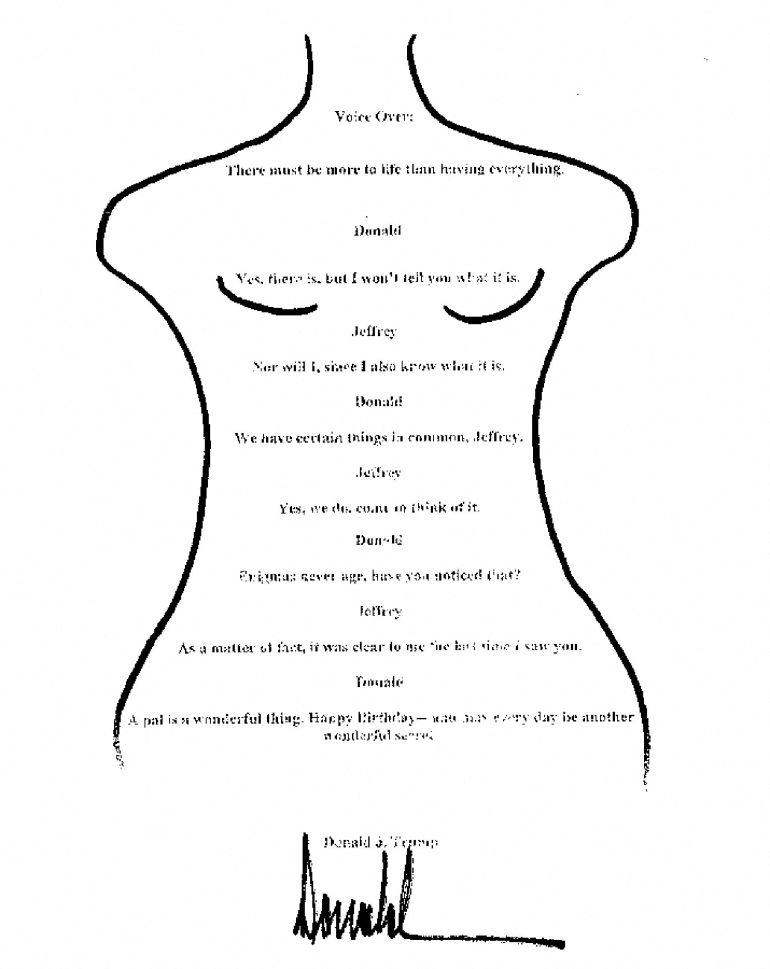
US president’s denial comes after White House said it would support a forensic analysis of the signature. Published On 10 Sep 202510 Sep 2025 US President Donald Trump has repeated his denial that he penned a lascivious birthday message to Jeffrey Epstein amid sustained scrutiny of his links to the convicted sex offender. Speaking to reporters in Washington, DC, on Tuesday, Trump said the signature on the note to Epstein was not his. Recommended Stories list of 4 itemsend of list “It’s not my signature, and it’s not the way I speak. And anybody that has covered me for a long time knows that’s not my language,” Trump said. “It’s nonsense.” Trump’s denial came after the White House said earlier that it would support a forensic analysis of the signature to prove it did not belong to the US president. “The president did not write this letter. He did not sign this letter,” White House press secretary Karoline Leavitt said. The release of the note, contained in a 238-page scrapbook compiled to commemorate Epstein’s 50th birthday in 2003, has reignited long-simmering controversy over Trump’s connections to the late financier, who died in a New York jail cell in 2019 while facing sex trafficking charges. Democrats in the US House of Representatives published the suggestive letter on Monday after the scrapbook was turned over to lawmakers by Epstein’s estate. The so-called “birthday book” also contains purported greetings from high-profile figures including former US President Bill Clinton, Apollo Global Management cofounder Leon Black, and former Harvard University law professor Alan Dershowitz. The birthday letter Trump allegedly wrote to sex offender Jeffrey Epstein more than 20 years ago, as presented by House Democrats on their X account on September 8, 2025 [Handout via Reuters] Trump previously denied writing the letter, which features the sketched outline of a naked woman with the president’s purported signature in place of her pubic hair, after its existence was first reported by The Wall Street Journal in July. Advertisement Trump has sued the newspaper over the report, seeking at least $20bn in damages. Trump has for months been dogged by questions about Epstein, including from some of his most ardent supporters. Many members of his Make America Great Again (MAGA) movement reacted with outrage in July when a law enforcement review concluded that Epstein died by suicide and there was no credible evidence that he had kept a “client list” or blackmailed powerful figures. Epstein, who had ties to some of the most prominent names in politics and business, has been the source of unproven theories for years, including that he was murdered to protect the existence of a sexual blackmail ring operated by US or foreign intelligence. Many MAGA supporters had backed Trump’s re-election in the belief he would reveal Epstein’s involvement in a vast conspiracy implicating figures at the very highest levels of power. Like many elite figures, Trump associated with Epstein during the 1990s and 2000s, once describing him as a “terrific guy” who liked women “on the younger side”. Trump, who has denied having prior knowledge of Epstein’s crimes, has said the two men had a falling out more than two decades ago after the financier tried to hire young women away from his Mar-a-Lago resort. Adblock test (Why?)
Israel kills over 50 in Gaza; Qatar calls Israeli attack ‘state terror’
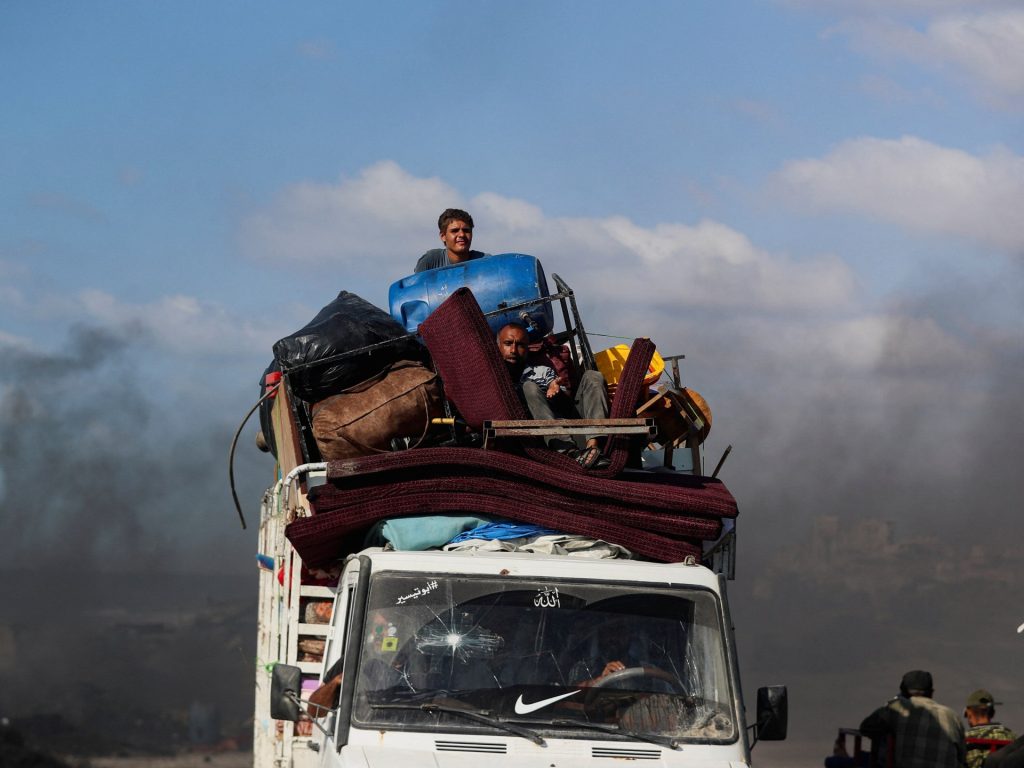
As the world’s attention was focused on Israel’s attack on Hamas leaders in Doha, Israeli forces continued their unrelenting bombardment of Gaza, killing more than 50 people on Tuesday. Among the dead are nine Palestinians, who had gathered in the enclave’s south seeking aid. Israel pressed on with its offensive in Gaza City after Prime Minister Benjamin Netanyahu threatened Palestinians to flee to the south for their lives. Recommended Stories list of 4 itemsend of list The Wafa news agency reported that a drone strike on a makeshift tent sheltering displaced families at Gaza’s port killed two civilians and injured others. Warplanes also hit several residential buildings, including four homes in the al-Mukhabarat area and the Zidan building northwest of Gaza City, it reported. Another house was reportedly bombed in the Talbani neighbourhood of Deir el-Balah in central Gaza, while two young men were killed in an attack on civilians in the az-Zarqa area of Tuffah, northeast of Gaza City. Al Jazeera’s Sanad fact-checking agency confirmed footage showing an Israeli strike on the Ibn Taymiyyah mosque in Deir el-Balah. The video captured a flash of light before the mosque’s minaret was enveloped in smoke. Despite the blast, the minaret appeared to remain standing. Israel issued new evacuation threats on Monday, releasing maps warning Palestinians to leave a highlighted building and nearby tents on Jamal Abdel Nasser Street in Gaza City or face death. It told residents to move to the so-called “humanitarian area” in al-Mawasi, a barren stretch of coast in southern Gaza. Advertisement But al-Mawasi itself has been repeatedly bombed, despite Israel insisting it is a safe zone. At the start of the year, about 115,000 people lived there. Today, aid agencies estimate that more than 800,000 people – nearly a third of Gaza’s population – are crammed into overcrowded makeshift camps. Philippe Lazzarini, the chief of the United Nations agency for Palestinian refugees, UNRWA, described al-Mawasi as a vast camp “concentrating hungry Palestinians in despair”. “There is no safe place in Gaza, let alone a humanitarian zone. Warnings of famine have fallen on deaf ears,” he said. The Palestinian Civil Defence warned that “Gaza City is burning, and humanity is being annihilated”. The rescue agency said that in just 72 hours, five high-rise towers containing more than 200 apartments were destroyed, leaving thousands of people homeless. More than 350 tents sheltering displaced families were also flattened, it added, forcing nearly 7,600 people to sleep in the open, “struggling against death, hunger, and unbearable heat”. More than 64,000 Palestinians have been killed, some 20,000 of them children, in the Israeli offensive, which has been dubbed a genocide by numerous scholars and activists. The International Criminal Court has also issued an arrest warrant for Netanyahu for alleged war crimes. ‘The crime of forced displacement’ The Government Media Office in Gaza said that more than 1.3 million people remain in Gaza City and surrounding areas, despite Israeli attempts to push them south. It described the evacuation orders as an effort to carry out “the crime of forced displacement in violation of all international laws”. More than 90 percent of Gaza’s 2.3 million people have been displaced multiple times in 23 months of genocidal war, and an Israeli curb on aid entry, including food items, has led to starvation deaths. Last month, a UN agency declared famine in Gaza, affecting half a million people. On Tuesday morning, Palestinians in central Gaza staged a protest against the latest evacuation orders. Reporting from Deir el-Balah, Al Jazeera’s Hind Khoudary said that demonstrators carried banners reading, “We will not leave”, and “Not going out”. “The primary goal of the [Israeli] occupation is displacement,” said Bajees al-Khalidi, a displaced Palestinian at the protest. “But there’s no place left, not in the south, nor the north. We’ve become completely trapped.” Violence also flared in the occupied West Bank, where Israeli forces killed two teenagers in the Jenin refugee camp, according to the Wafa news agency. Advertisement Mourners on Tuesday buried 14-year-old Islam Noah, who was shot while attempting to enter the besieged refugee camp. A funeral was also held for another 14-year-old, Muhammad Alawneh. Two others were wounded in the same incident. Israel targets Hamas leaders Israel sent missiles at Doha as Hamas leaders were meeting in the Qatari capital for talks on the latest ceasefire proposal from the United States to end the war in Gaza. Hamas said five people were killed, while Qatar said a security official was also among the dead. Hamas said its leadership survived the assassination attempt. Qatar’s Emir Sheikh Tamim bin Hamad Al Thani condemned Israel’s “reckless criminal attack” in a phone call with US President Donald Trump. Qatari Prime Minister and Minister of Foreign Affairs Sheikh Mohammed bin Abdulrahman bin Jassim Al Thani called the attack “state terrorism”. The Qatari prime minister said Doha would continue to work to end Israel’s war on Gaza, but raised doubts about the viability of the most recent talks. “When it comes to the current talks, I don’t think there is something valid right now after we’ve seen such an attack,” he said. Qatar has sent a letter to the UN Security Council, condemning what it calls a cowardly Israeli assault on residential buildings in Doha. The Doha attack has drawn global condemnation, with the UN chief calling it a “flagrant violation” of the sovereignty and territorial integrity of Qatar. The White House claimed that the US had warned Qatar of the impending strike, but Doha rejected that account, insisting the warning came only after the bombing had begun. Trump later said he felt “very badly about the location of the attack” and that he had assured Qatar that it would not happen again. “This was a decision made by Prime Minister Netanyahu, it was not a decision made by me,” Trump wrote on Truth Social. “Unilaterally bombing inside Qatar, a Sovereign Nation and close Ally of the United States, that is working very hard and bravely taking risks with us to broker
Poland downs drones during airspace intrusion as Russia attacks Ukraine

DEVELOPING STORYDEVELOPING STORY, Polish Prime Minister Donald Tusk says military defences deployed after ‘multiple violations of Polish airspace’. Published On 10 Sep 202510 Sep 2025 Poland has shot down drones over its territory after repeated violations of its airspace during a Russian aerial attack on neighbouring Ukraine, the Operational Command of the Polish Armed Forces said. “During today’s attack by the Russian Federation targeting targets in Ukraine, our airspace was repeatedly violated by drones,” the Polish command said in a statement early on Wednesday. Recommended Stories list of 4 itemsend of list “At the request of the Operational Commander of the Armed Forces, weapons have been used, and operations are under way to locate the downed targets,” the military said. The army said that Polish and NATO military aircraft had been mobilised to ensure airspace safety. “Polish and allied aircraft are operating in our airspace, while ground-based air defence and radar reconnaissance systems have been brought to the highest state of readiness,” the operational command said. Polish Prime Minister Donald Tusk confirmed that an “operation is under way related to multiple violations of Polish airspace”. Trwa operacja związana z wielokrotnym naruszeniem polskiej przestrzeni powietrznej. Przeciwko obiektom wojsko użyło uzbrojenia. Jestem w stałym kontakcie z Prezydentem i Ministrem Obrony. Odebrałem bezpośredni meldunek od dowódcy operacyjnego. — Donald Tusk (@donaldtusk) September 10, 2025 Translation: An operation is under way related to multiple violations of Polish airspace. The military used armaments against the objects. I am in constant contact with the President and the Minister of Defence. I received a direct report from the operational commander. Earlier, it was reported that four airports in Poland, including its main Chopin airport in Warsaw, were closed due to military activity. According to notices posted to the US Federal Aviation Administration’s website, the three other airports closed were Rzeszow–Jasionka airport, the Warsaw Modlin airport, and the Lublin airport. Poland’s military did not mention the airport closures. Advertisement The military mobilisation in Poland came after Ukraine’s Air Force reported that Russian drones had entered Polish airspace, posing a threat to the city of Zamosc, but the air force later removed the statement from its Telegram messaging app. Most of Ukraine, including the western regions of Volyn and Lviv, which border Poland, were under air raid alerts for several hours overnight, according to Ukraine’s Air Force data. Poland said earlier that it planned to close its border with Belarus at midnight local time on Thursday (22:00 GMT, Wednesday) due to Russian-led military exercises scheduled to take place in Belarus. Russia and Belarus’s large-scale military exercises, known as the “Zapad” drills, have raised security concerns in neighbouring NATO member states: Poland, Lithuania and Latvia. The “Zapad-2025” (West-2025) drills will be held in western Russia and Belarus from Friday. Asked about the duration of the border closure, Polish Minister of Interior Marcin Kierwinski said it would only be reopened when the government was sure “there was no more threat to Polish citizens”. The Belarusian Ministry of Foreign Affairs said it had summoned the Polish charge d’affaires to complain about the border closure, which it said “caused significant difficulties”. It described Poland’s move as “an abuse of its geographical position”. “The temporary suspension of passage indicates rather an intention to conceal one’s own actions than the existence of any threat from Belarus,” the Foreign Ministry said. Lithuania’s border guard said on Tuesday that the protection of its border with Belarus and Russia would be strengthened due to the exercises. Adblock test (Why?)
Video: Al Jazeera reports from near the scene of Israeli strike in Qatar
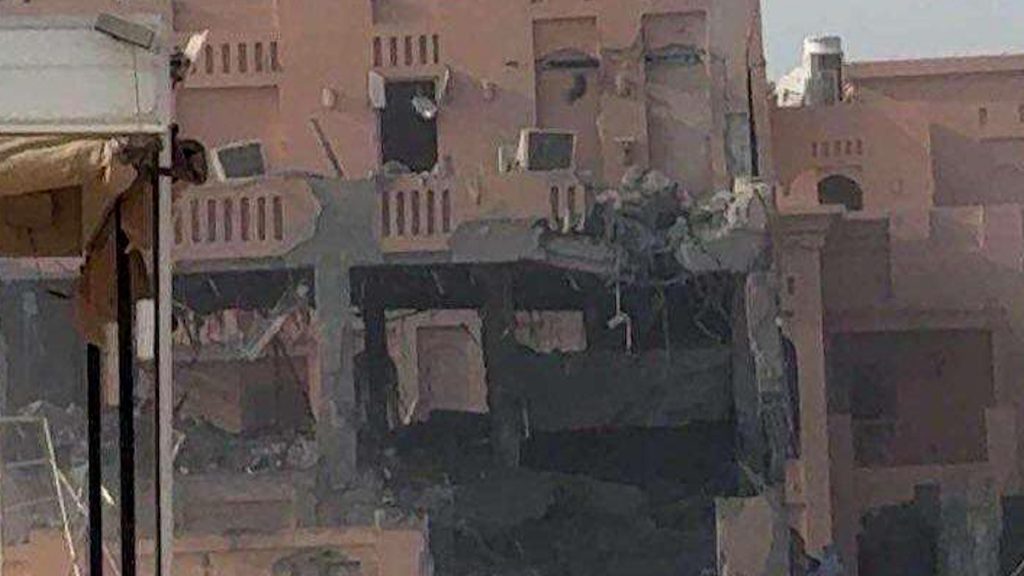
NewsFeed Al Jazeera’s Charles Stratford is near to the scene of where an Israeli strike targeted ‘Hamas leaders’ at a residential area in Doha. He says there is a great sense of anxiety across the city over the attack. Published On 9 Sep 20259 Sep 2025 Adblock test (Why?)
UN condemns Israel’s ‘targeted strike’ on Hamas officials in Doha
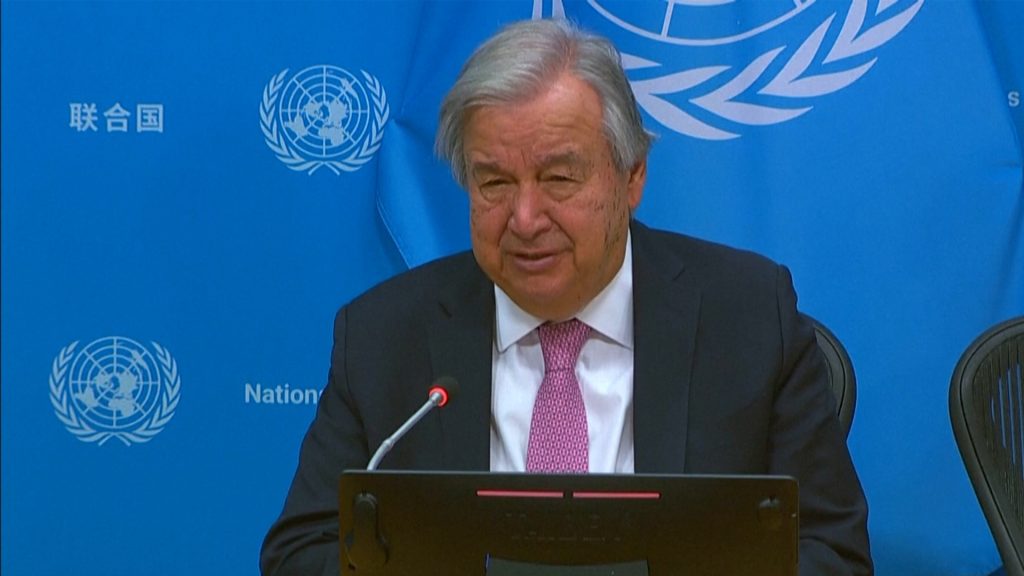
NewsFeed António Guterres, the Secretary-General of the United Nations, has called Israel’s ‘targeted strike’ on Hamas officials in Doha a ‘flagrant violation of the sovereignty and territorial integrity of Qatar.’ Published On 9 Sep 20259 Sep 2025 Adblock test (Why?)
Jerusalem shooting escalates “collective punishment acts”
[unable to retrieve full-text content] “There is almost no Palestinian city or village that escapes attacks from illegal settlers.”
Charting the past year of Russian drone and missile attacks on Ukraine
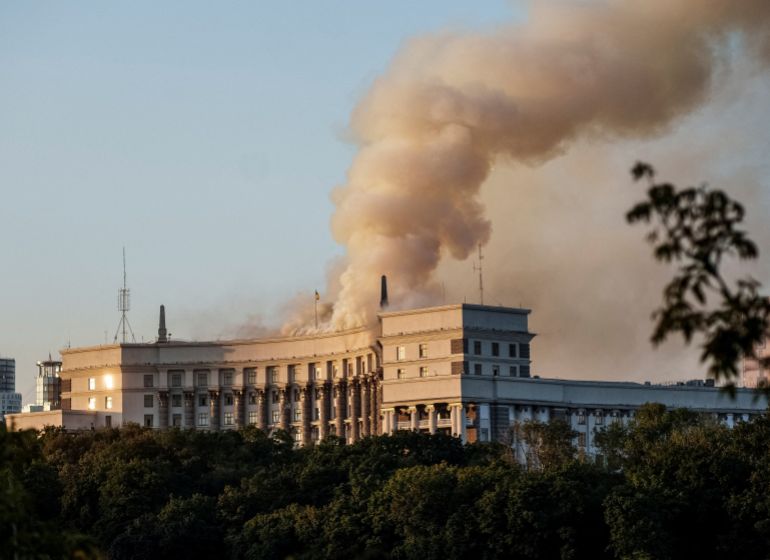
On Sunday, Russia launched its largest drone and missile attack since the war began, firing a total of 823 projectiles into Ukraine. The attack killed at least four people, wounded 44, and caused damage to a key building in Kyiv’s government district, making it the first on the site since the full-fledged war began in February 2022. Ukraine’s air force said Russia fired 810 drones and decoys, as well as 13 cruise and ballistic missiles. They added that nine missiles and about 60 drones had made it through their air defences and landed in Ukraine. Smoke rises over a Ukrainian government building after Russian drone and missile strikes in Kyiv on September 7, 2025 [Serhii Korovainyi/Reuters] The air force said 33 locations were struck across Ukraine, with officials saying that Russian strikes damaged civilian and residential infrastructure in Kyiv, Sumy, Dnipro, and Zaporizhzhia cities; Kremenchuk in Poltava province; Kryvyi Rih in Dnipropetrovsk province; Sloviansk in Donetsk province; and parts of Chernihiv and Cherkasy provinces. How many drone strikes has Russia launched? Since the start of the year, Russia has launched at least 37,000 air attacks on Ukraine, according to a tally by the Center for Strategic and International Studies. According to the Institute for the Study of War (ISW), Russia has intensified drone strikes following Ukraine-Russia bilateral talks in Istanbul, Turkiye, on May 15. The talks, pushed by United States President Donald Trump, did not yield any breakthrough. Advertisement Between January and May 2025, Russian drone strikes averaged about 120 strikes per day. From May to August, drone strikes averaged 185 per day. What types of drones is Russia using? Russia is mainly using Shahed-type drones in their attacks. At the start of the war, these low-cost weapons were primarily supplied by Iran. The number of Russian drones has risen significantly, with Moscow scaling up its production of Shahed-type drones, known as Gerans (Russian analogues of the Iranian missiles), Garpiyas (made with Chinese components), and Gerberas (low-cost decoys that mimic Shaheds on radar but carry little or no explosives, intended to deplete Ukraine’s expensive interceptor missiles). Russia is producing these drones in Tatarstan and has opened a new production line at the Izhevsk Electromechanical Plant, where it already produces Garpiya drones, according to the ISW. In June 2025, Ukrainian defence intelligence suggested that Russia was capable of producing an average of 170 Shahed-type drones per day (about 5,100 per month) and planned to increase production to 190 drones per day by the end of 2025. The Russian-made Geran-1 (also known as Shahed 131) and Geran-2 (also known as Shahed 136) are low-cost, with a price range of $20,000-$50,000 for domestic production, but have a high impact. The Shahed-131 is a smaller munition with a range of 700-900km (435-560 miles), while the larger Shahed-136 has a range of at least 2,000km (1,243 miles). They are known for flying at low altitudes and slow speeds. That means they can be shot down by individual soldiers, but they can also be used against front-line positions and are more manoeuvrable than faster missiles. Some of Russia’s homegrown drones include the Lancet kamikaze drone, designed for precision strikes, the ZALA family of reconnaissance and attack drones, and several reconnaissance models such as the Orlan-10, Supercam and Merlin-VR. However, Russia is predominantly relying on Shahed-type drones, and — alongside those — is also using cruise missiles and ballistic missiles. Russian soldiers prepare a Lancet drone for action in an undisclosed location in Ukraine [Russian Ministry of Defence via AP] What type of air defence system has Ukraine used against Russian air attacks? Ukraine has employed several tactics and weapons to take down or disable drones, including modern air defence systems alongside mobile fire teams and electronic warfare. Man-portable air defence kits (MANPADS), heavy machineguns and German-made IRIS-T and US-made NASAMS and SHORAD missile defence systems have also been used against drone attacks, intensifying in recent weeks. Advertisement Ukraine has had the most success in downing drones with the German radar-assisted Gepard anti-air 35mm gun and domestically-developed interceptor drones, according to Ukrainian drone warfare expert Olena Kryzhanivska. Chancellor Olaf Scholz gets off a German self-propelled anti-aircraft gun Flakpanzer Gepard during a visit to the training programme for Ukrainian soldiers near Oldenburg, Germany, on August 25, 2022 [Axel Heimken/Pool via Reuters] Ukrainian President Volodymyr Zelenskyy has made domestically produced weapons a top priority, saying in July that within six months, the country’s domestic arms production should aim to reach 50 percent of its needs. Ukraine has also used the US-made Patriot system against ballistic and cruise missiles, providing a critical layer of defence against long-range attacks, including from some of Russia’s most advanced missiles. What are the latest developments on the ground? Currently, Russia controls one-fifth – 114,500sq km (44,600sq miles) – of Ukrainian land, with about 88 percent of the Donbas under its control and three-quarters of Zaporizhia and Kherson oblasts. For most of this year, the war has settled into a grinding impasse with heavy losses on both sides; however, in August, Russian forces made significant gains, advancing about 10km (6 miles) beyond the front lines. Adblock test (Why?)
Nepal Gen-Z protests live: Nepali Congress office, leaders’ homes on fire
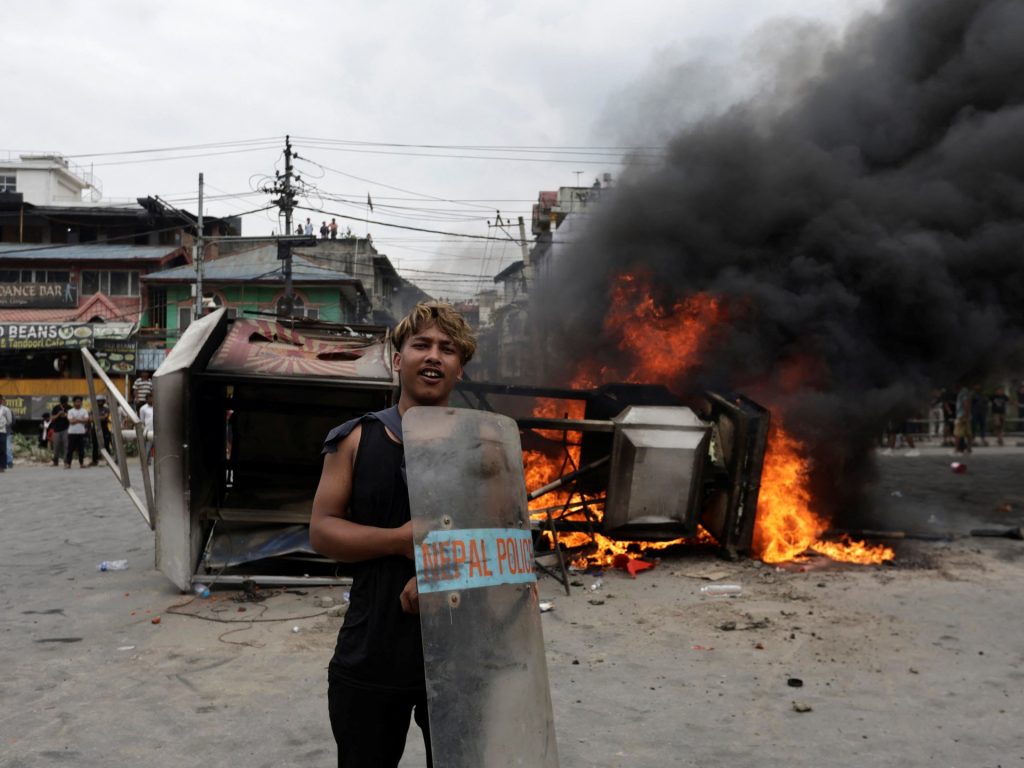
blinking-dotLive updatesLive updates, Protesters set fire to homes of some top political leaders, a day after 19 people were killed by the security forces. Published On 9 Sep 20259 Sep 2025 Adblock test (Why?)
Nineteen killed in Nepal protests against corruption and internet bans
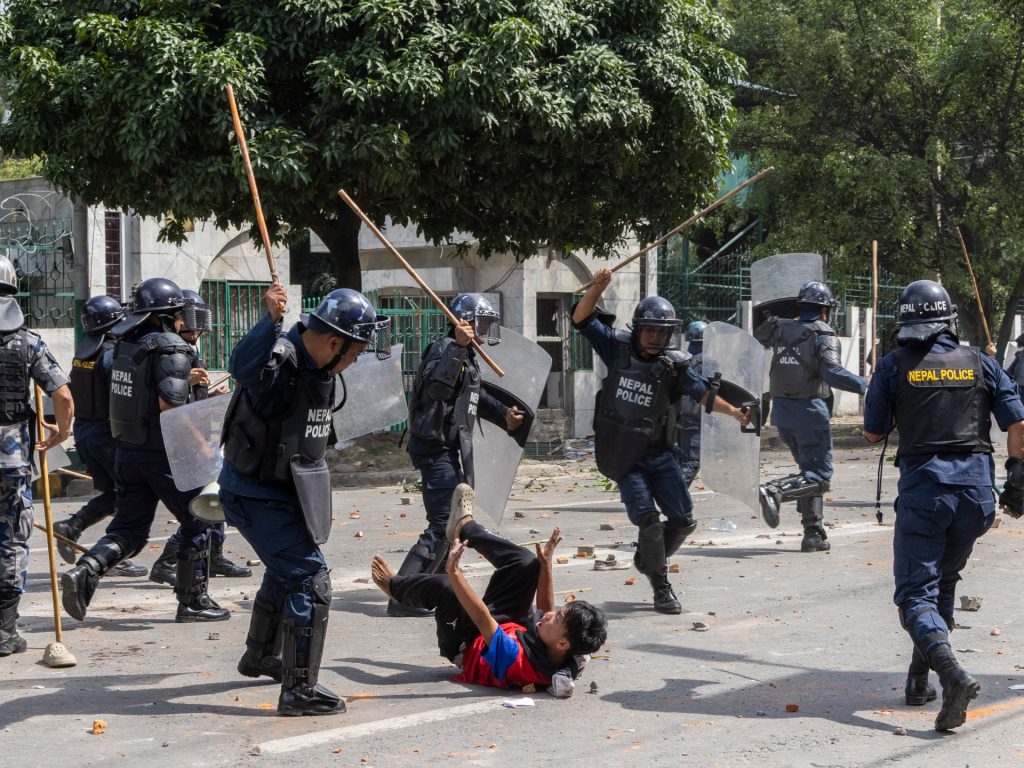
Published On 9 Sep 20259 Sep 2025 Nepal has lifted its social media ban one day after protests turned deadly, with at least 19 people killed by security forces as demonstrators rallied against internet restrictions and government corruption. Police fatally shot 17 people in Kathmandu, according to spokesman Shekhar Khanal, with two additional deaths reported in eastern Nepal’s Sunsari district. Officers deployed rubber bullets, tear gas, water cannons and batons when protesters broke through barbed wire barriers attempting to reach Parliament. Approximately 400 people sustained injuries, including more than 100 police officers. Home Minister Ramesh Lekhak resigned following the violence. “I had been there for a peaceful protest, but the government used force,” said 20-year-old Iman Magar, who was struck in his right arm. “It was not a rubber bullet but a metallic one, and it took away a part of my hand. The doctor says I need to undergo an operation.” Emergency vehicles rushed the wounded to hospitals throughout the city. “I have never seen such a disturbing situation at the hospital,” said Ranjana Nepal, information officer at the Civil Service Hospital. “Tear gas entered the hospital area as well, making it difficult for doctors to work.” The social media ban triggered widespread anger, particularly among younger Nepalis who depend on these platforms for communication. Amnesty International reported that authorities used live ammunition against protesters, while the United Nations called for a transparent investigation. Advertisement Millions of Nepalis use platforms like Instagram for entertainment, news, and business purposes. “This isn’t just about social media – it’s about trust, corruption, and a generation that refuses to stay silent,” wrote the Kathmandu Post newspaper. “Gen Z grew up with smartphones, global trends, and promises of a federal, prosperous Nepal. For them, digital freedom is personal freedom. Cutting off access feels like silencing an entire generation.” Nepal has previously restricted online platforms, blocking Telegram in July over fraud concerns and implementing a nine-month TikTok ban that ended last August when the company agreed to comply with local regulations. Adblock test (Why?)

